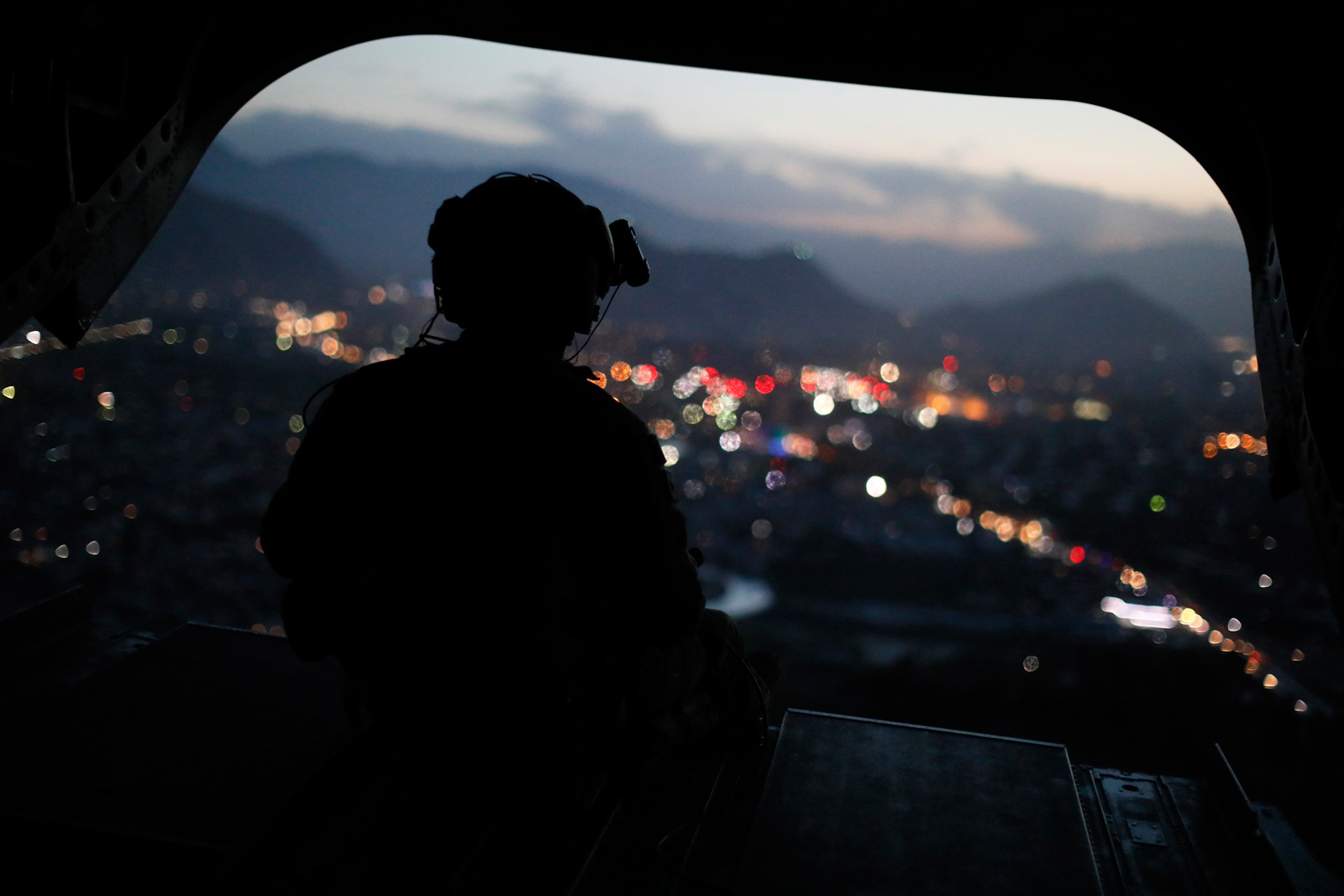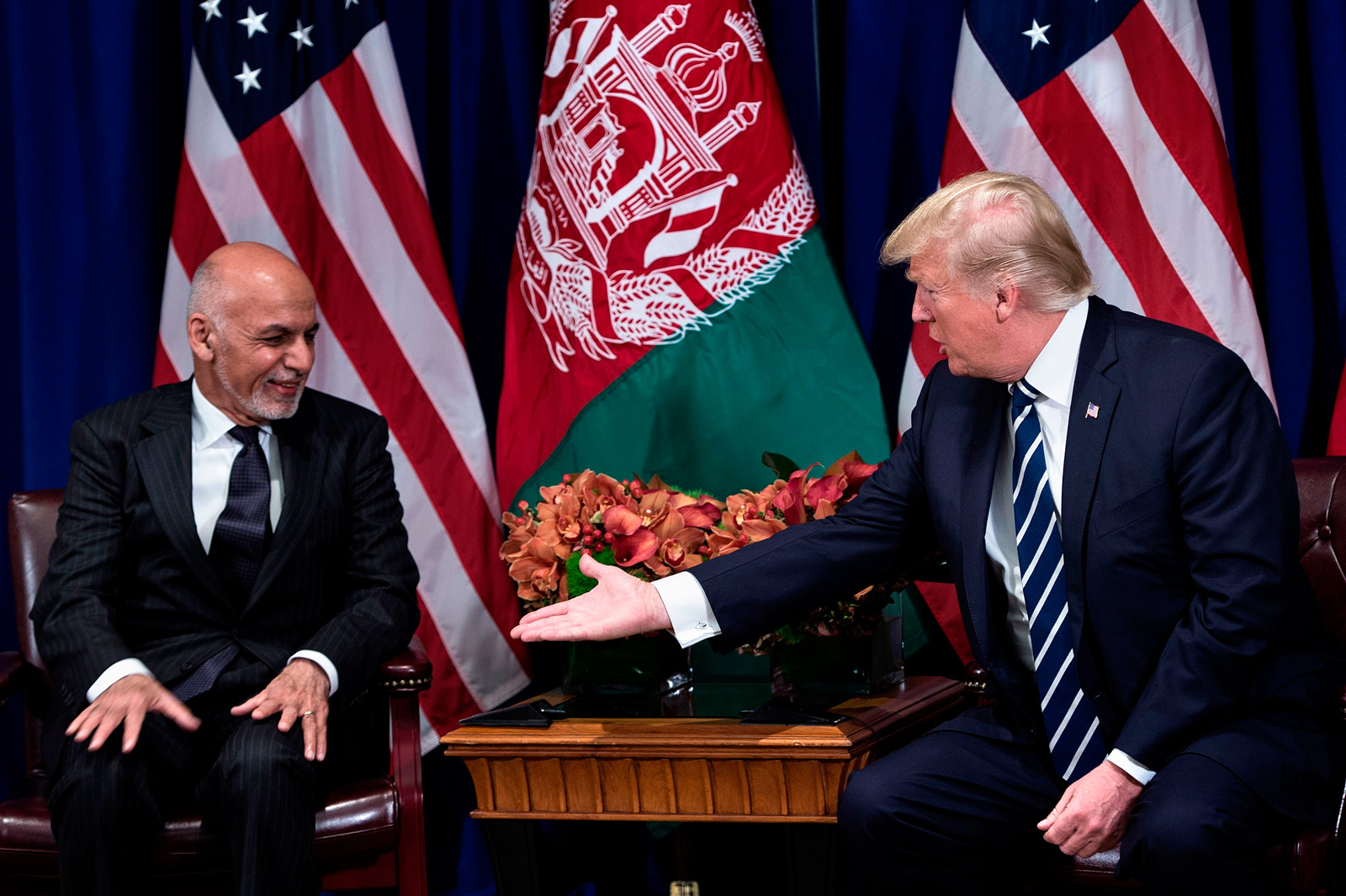For Presidents George W. Bush and Barack Obama, Afghanistan was “the just war,” but for President Donald Trump it is just a war he didn’t want to deal with. Reluctant from the start of his term to send more US troops to Afghanistan, after taking eight months to decide what to do, Trump has finally been persuaded to send 3,900 more troops by a military high command that is getting anxious about the possibility of failure. There is no timeline for American troops to come home.
The war has gone on for sixteen years, and as recent meetings at the United Nations General Assembly demonstrated, it has become even more complicated than the one fought by Bush or Obama. Afghanistan faces a number of growing internal threats: terrorist attacks, loss of territory to the Taliban, economic collapse, corruption, growing public disenchantment, and an internal political crisis as warlords and ethnic politicians challenge the government of President Ashraf Ghani. But the gravest new threat is regional. At least three nearby states—Pakistan, Iran, and Russia—are now helping the Taliban, according to US generals, Western diplomats, and Afghan officials I have spoken to.
Yet there appears to be little awareness of these threats in Washington. Trump’s policy statement on Afghanistan on August 21 and his address to the UN on September 19 talked up the US military deployment, and his language was a smokescreen of “winning” and “victory” that gave no hint as to what these troops would do differently to gain back ground lost to the Taliban. In a further military escalation, the Trump administration is also preparing to dismantle limits set by Obama on drone strikes. The CIA, rather than just the Defense Department, will now be authorized to carry out drone attacks, which in the future will not require high-level vetting and will be allowed to target the foot soldiers of militant groups, as well as specified leaders.
At the same time, President Trump has ruled out “nation building” and made no mention of economic or diplomatic support for the Afghan government. America’s NATO allies now emphasize a political solution to the war and peace talks with the Taliban, but there was no hint of compromise or interest in negotiations by Trump. The only avenue left for negotiation is the Taliban office in Qatar, which has been used for the past six years by multiple mediators, including representatives of the United Nations, the US, and several European countries. Now, however, according to The Guardian and diplomatic sources, it appears that Presidents Trump and Ghani agree that the office should be shut down. That would mean closing the last open access to some Taliban leaders, and it would make any future negotiations with the Taliban movement even more difficult and entirely dependent on Pakistan.
Not that the US is ready to lay the groundwork for an eventual political solution. There is still no team in place at the State Department or the National Security Council that can carry out the many complex tasks needed. The new US ambassador to Kabul was appointed only in late September. As I described in a previous post, Trump has effectively handed over conduct of the war to his generals.
In the past, Afghan-related initiatives taken by US presidents, whether at the UN or at NATO summits, met with immediate backing from European and other allies. This time, there was not a single ally who publicly praised or endorsed Trump’s Afghan policy. The tepid applause from world leaders for his UN speech spoke volumes. Only NATO’s secretary general, Jens Stoltenberg, belatedly welcomed the sending of more US troops in an interview with a wire service. (NATO’s own deployment of some four thousand troops in Afghanistan will continue.)
The most enthusiastic backer of Trump’s proposals was, not surprisingly, the beleaguered Ghani. The Afghan president adroitly gave Trump the ultimate accolade: that his Afghan policy was better than Obama’s.
In reality, the US strategy offers little help to Ghani with the multiple crises he faces at home, where politicians and warlords who once supported him are in revolt and demanding that he either carry out promised reforms and hold elections or step down. The country is in the throes of a severe economic crisis, and there is no apparent plan for dealing with either the tens of thousands of internal refugees who have been displaced by the war or the nearly one million refugees who have arrived in Afghanistan penniless after being forced out of Pakistan and Iran.
The fighting with the Taliban has intensified in recent weeks, and is now spread across a dozen provinces. The US military estimates that the Taliban controls about 40 percent of the country and one third of its population.
Advertisement
These Taliban successes would have been impossible without the support and sanctuary that the group receives from a number of countries. This was a major focus of Trump’s accusations at the UN. Trump has taken a hard line against Pakistan for its longtime harboring of the Taliban leadership.
“It is time to expose and hold responsible those countries who support and finance terror groups like al-Qaeda, Hezbollah, the Taliban,” he told the General Assembly, making a clear allusion to Pakistan. In his August policy statement, the president criticized Pakistan by name.
Pakistan has a record stretching back to the 1970s of giving succor to Afghan extremists of one kind or another in order to gain political leverage over its neighbor. After the Taliban’s initial defeat in 2001, when America and its allies first occupied Afghanistan, Pakistan helped restore the militants’ strength and has sustained the Taliban with its so-called Quetta Shura, or Leadership Council, which is based in the Pakistani province of Balochistan.
“The Quetta Shura, Peshawar Shura, these shuras are identified by cities inside Pakistan,” said General John W. Nicholson, the commander of US forces in Afghanistan, in Kabul in August, “we know Afghan Taliban leaders are in these areas.”
Pakistan strongly denies these accusations and says that it, too, has sacrificed much in its own war against terrorism. Interviewed at the UN, Pakistan’s new prime minister, Shahid Khaqan Abbasi, said, “There are no sanctuaries anymore. There are none at all. I can categorically state that.”
But Pakistan’s Afghan policy is in the hands not of the politicians, but of the military and its Inter-Services Intelligence agency. One reason that the previous prime minister, Nawaz Sharif, was forced to step down last month was his constant tussle with the military over his policy of improving relations with India and Afghanistan. In contrast to Sharif, Abbasi reflects the military viewpoint faithfully, professing his strong opposition to Indian political involvement in Afghanistan, something that Trump has supported, much to Pakistan’s chagrin.
The Taliban also receives support from Iran and Russia. NATO diplomats have told me that while Russia has built contacts with the Taliban operating in northern Afghanistan along the borders of Central Asia, Iran has been backing Taliban militants in the west of the country. The goals of Russia and Iran are to have influence in Kabul if the present government collapses and the Taliban comes to power. They also seek to ensure that Pakistan does not dominate the Taliban as it did in the 1990s, and that the Taliban continues to resist the spread of the Islamic State in Afghanistan and the entire region.
There is an urgent need for reconciliation among the regional neighbors so that the Taliban can be pushed into peace talks. But the US is not in a good position to act as broker. America has no diplomatic dialogue with Russia or Iran. It has poor relations with Pakistan, which it is now threatening with sanctions. And it is suspicious of China, which has so far been helpful in trying to initiate regional talks. The US’s only friend in the region is India, which is not a direct neighbor of Afghanistan and whose participation in Afghan affairs Pakistan will not tolerate. As if to demonstrate how far apart all the interested states are, an announcement followed the UN meeting that the US defense secretary, Jim Mattis, will travel to New Delhi to urge India to do more in Afghanistan, while Pakistan’s all-powerful army chief, General Qamar Bajwa, will make an unprecedented trip to Moscow to muster Russian assistance.
If there is hope for a change of US policy in Afghanistan, it depends on the willingness of the Trump administration to listen to the recommendations put forward by John Sopko, the Special Inspector General for Afghanistan Reconstruction, a nonpartisan body empowered by Congress to report on mistakes made by the US in Afghanistan since 2001. In a speech in Washington on September 21, Sopko outlined some lessons learned and his recommendations for improving the performance of the Afghan security forces and for spending US funds more effectively.
Sopko’s first main finding was a direct criticism of how the US military has failed in recent years to stabilize and sustain nations in post-conflict situations, Afghanistan foremost among them. He also argued that support for the Afghan army needs to better fit the country’s “contexts and needs” if that force is to survive a US military withdrawal. Moreover, the US has to encourage any host nation to “take ownership of security sector assistance programs.” This has long been the aim, but over the past sixteen years, the US military has never succeeded in it, either in Afghanistan or in Iraq. Despite spending more than $74 billion on training and equipping the Afghan army, the results have been dismal. Although Sopko’s recommendations command respect among independent policy experts in Washington, there is little sign that the Pentagon under Mattis is paying attention.
Advertisement
Afghanistan’s neighboring states may wish to see peace there, but they all want it on their own terms and with their own national interests preserved above all. The growing involvement of major powers like Russia and Iran in backing the Taliban will affect America’s ability to train the Afghan army well enough and fast enough to win the war. The Trump administration has reversed the Obama administration’s error of giving the Taliban a timeline for American withdrawal. But there is little sign of any plan, policy, or political will other than a continued US military presence of indefinite duration. It is hard to see the next sixteen years turning out any better than the last.




